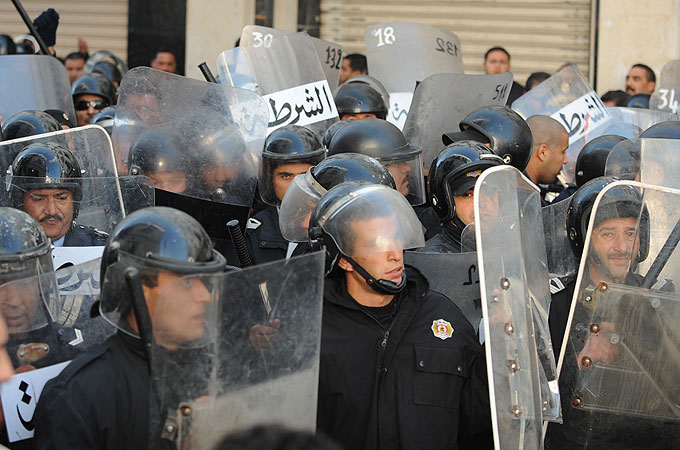Violent clashes continue in Tunisia
Protests over unemployment continue to spread across the country as the government forces try to curb growing unrest.

 |
| The opposition criticised the government’s response and said that protests were fuelled by lack of human rights [AFP] |
Clashes over unemployment and the high cost of living spread across Tunisia, with the latest rallies between demonstrators and police turning violent in the city of Thala, 250km from the capital, witnesses have said.
About 250 demonstrators, mostly students, attended a peaceful march on Monday afternoon to express their support for the protests in the region of Sidi Bouzid, a union source told AFP.
The march then turned violent when police tried to contain the protesters by firing tear gas canisters, one of which fell into a mosque.
Enraged, the protesters then reportedly set fire to tyres and attacked the local offices of the ruling party, the source said.
Media blackout
Lina Ben Mhenni, a Tunisian blogger and university assistant, told Al Jazeera that people in the capital Tunis were talking about some protesters being seriously injured, but there was no way of confirming this as there was an information crackdown.
“The government has cracked down on activists by hacking our emails, facebook and blogs. They have deleted a few pages in which I was writing about the public protests,” Ben Mhenni said.
“All the demonstrations that were supposed to be organised yesterday by the students in Tunis did not happen – the police surrounded all the high schools and all the universities in the city.”
She added that she had heard about some protests in high schools, but could not confirm any details. Students in the town of Sidi Bouzid held a protest that went ahead without any problems, AFP news agency reported.
“There are also videos online that recorded student protests in the city of Grombalia, some 30km away from Tunis,” she said.
These events all coincided on Monday with the opening of high schools after the holiday break.
Following a demonstration by lawyers last week that also turned violent, lawyers once again protested on Monday at the main courthouse in Tunis.
“The lawyers protested for Sidi Bouzid again, but also because of the violence that they experienced at the demonstration last week,” Ben Mhenni said.
Lawyers protest
On Tuesday, the Tunisian Bar Association announced a general strike to be staged next Thursday in protest over the attacks by security forces against a number of its members.
Opposition politicians said that dozens of lawyers were arrested during protests on Tuesday and Friday last week.
Ben Mhenni said that no big public demonstrations were planned for Tuesday, but activists were very active on the internet and were being supported by an international group of hackers called Anonymous.
“The group anonymous started actions against the government website and they are continuing a campaign they call ‘Operation Tunisia’,” she said.
The Tunisians protests began in the town of Sidi Bouzid early December when a young university graduate, Mohamed Bouazizi, attempted to end his life by setting himself on fire.
Protests against poverty, unemployment and general anti-government sentiments have subsequently spread across the country, but have been met with a harsh response from the government of President Zine al-Abidine Ben Ali, who has ruled Tunisia since 1987.
Mohamed Ben Madani, an analyst with the Maghreb Review, told Al Jazeera that events last week were extraordinary for Tunisia.
“Tunisia has been ruled by Ben Ali for 23 years with an iron fist and this is the first time that he has been challenged by people from various towns,” Madani said.
Mixed emotions
“Tunisian people are coming out and showing their anger for lack of food, lack of jobs and also lack of human rights.”
He said that for the first time, through the use of social media, the world was seeing videos and pictures of the protests.
Also on Monday, Palestinian president Mahmoud Abbas met with Ben Ali at the Carthage presidential palace in the suburbs of Tunis.
Abbas, who had to cut short of his trip due to the death of his brother, was in the Tunisian capital on an official visit at the invitation of Ben Ali. The latest Palestinian developments were reportedly discussed.
Quality of living
The Quality of Life Index 2011 ranked Tunisia 69th with a score of 60 points, conducted by the Irish magazine International Living.
This was the highest ranking for any Arab country and is based on official sources and statistics from World Health Organisation, government departments, UNESCO and other sources.
Al Jazeera’s coverage of events in Tunisia have been praised by some for filling a media void, and also attacked by others for being biased and unprofessional.